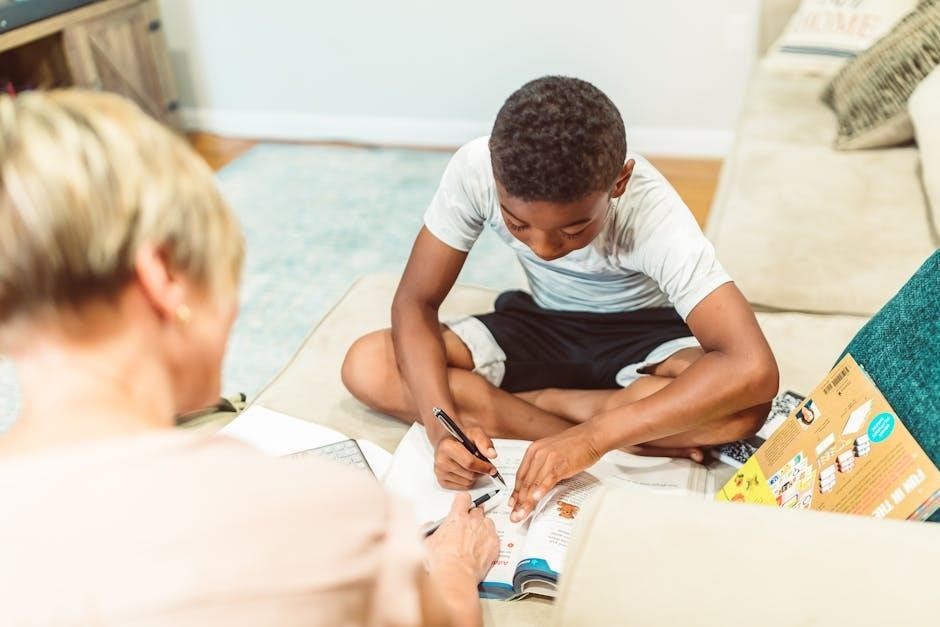
The Gambler Parents Guide is a comprehensive resource designed to help parents understand and address gambling-related issues in their children. It provides insights into the psychological aspects of gambling, its impact on family dynamics, and practical strategies for prevention and support. By fostering open communication and education, the guide aims to empower parents to create a protective environment and guide their children toward responsible decision-making. It serves as a vital tool in navigating the challenges of gambling addiction and promoting long-term well-being for the entire family.
1.1 What is The Gambler Parents Guide?
The Gambler Parents Guide is a detailed resource created to assist parents in understanding and addressing gambling-related issues among their children. It offers insights into the psychological aspects of gambling, its effects on family relationships, and practical strategies for prevention and support. Designed to empower parents, the guide provides tools to foster open communication, educate children about risks, and create a supportive home environment; It covers topics such as recognizing signs of addiction, legal aspects of gambling, and resources for seeking professional help, making it an essential tool for promoting healthy habits and long-term well-being for families affected by gambling.
1.2 Importance of a Parents Guide for Gambling-Related Issues
The Gambler Parents Guide plays a crucial role in empowering parents to address gambling-related issues effectively. By providing clear guidance, it helps parents recognize early warning signs of addiction, understand the psychological factors driving gambling behavior, and implement preventive measures. The guide also bridges the gap between home and school by offering collaborative strategies with educational institutions. Its importance lies in fostering a proactive approach to gambling education, ensuring that parents are equipped to support their children’s mental and emotional well-being. This resource is vital for creating a protective environment and promoting responsible decision-making in young individuals.

Understanding Gambling and Its Impact
Gambling involves betting on games of chance, often leading to addiction. Its impact includes financial strain, emotional distress, and strained family relationships, affecting mental health and stability.
2.1 What is Gambling?
Gambling is the act of betting money or something of value on an event with uncertain outcomes, with the primary intent of winning money or material goods. It involves a combination of skill, chance, and risk, often creating a psychological response that can lead to addiction; Gambling activities include lotteries, casinos, sports betting, and online games. While some view it as entertainment, others experience negative consequences, such as financial loss and emotional distress. Understanding gambling’s nature is crucial for addressing its impact on individuals and families.
2.2 Types of Gambling
Gambling encompasses various forms, each with distinct characteristics and risks. Common types include casino games like slot machines and poker, sports betting on events, lotteries, and online gambling platforms. Additionally, there are skill-based games such as bingo and card games. Each type carries its own potential for addiction and financial strain. Understanding these variations is essential for parents to identify and address gambling-related issues in their children. Recognizing the different forms helps in tailoring strategies to prevent and manage gambling problems effectively.
2.3 The Psychology Behind Gambling
Gambling behavior is deeply rooted in psychology, often driven by emotions, cognitive biases, and environmental factors. The desire for excitement, the belief in luck, and the thrill of winning activate dopamine release, creating a sense of pleasure. Cognitive distortions, such as overestimating chances of winning, can lead to irrational decisions. Social influences and stress also play significant roles. Understanding these psychological mechanisms helps parents identify early warning signs and intervene effectively. By addressing the emotional and mental aspects, parents can guide their children toward healthier coping mechanisms and responsible behavior.
2.4 How Gambling Affects Families
Gambling can have profound effects on family dynamics, often leading to emotional distress, financial strain, and relationship breakdown. Family members may experience feelings of guilt, shame, or helplessness as they witness a loved one’s struggle. Financial instability can result in arguments, reduced trust, and difficulty in meeting basic needs. Children, in particular, may suffer from emotional neglect or develop anxiety due to an unpredictable home environment. The strain on relationships can lead to isolation, making it harder for families to seek support. Addressing these challenges requires open communication, understanding, and collective effort to rebuild trust and stability.

Recognizing the Signs of Gambling Problems in Children
Parents should watch for changes in behavior, increased secrecy, and unexplained financial issues, which can signal a child’s gambling problem. Early recognition is crucial for intervention.
3.1 Common Signs of Gambling Addiction in Teens
Teenagers exhibiting gambling addiction may show increased secrecy, lying about activities, or unexplained financial losses. They might become irritable, anxious, or withdrawn, especially when unable to gamble. Academic performance often declines as gambling preoccupies their thoughts. Loss of interest in hobbies, constant requests for money, and defensive behavior when questioned are additional red flags. Mood swings, emotional detachment, and strained relationships with family and friends can also signal a problem. Recognizing these signs early is essential for timely intervention and support.
3.2 Behavioral Changes to Watch For
Parents should be vigilant for behavioral shifts that may indicate gambling-related issues. Teens might exhibit mood swings, becoming easily irritated or restless, especially when unable to gamble. They may also show a lack of interest in previously enjoyed activities, isolating themselves from friends and family. Excessive preoccupation with gambling, such as constantly talking or thinking about it, is another sign. Additionally, they may display impulsive decisions or a sudden need for privacy. These changes can signal deeper issues, making early recognition crucial for addressing potential problems effectively.
3.3 Financial Red Flags
Parents should monitor for financial signs that may indicate gambling-related problems. Teens might frequently ask for money or exhibit unexplained expenses. They may have difficulty explaining where their money goes or show a sudden interest in expensive items. Unusual patterns, like borrowing money from friends or family, could also be a red flag. Additionally, they might sell personal belongings or have debts they cannot explain. Secretive behavior about finances or reluctance to discuss spending habits can also signal potential issues. Recognizing these signs early can help address problems before they escalate.

The Role of Parents in Preventing Gambling Issues
Parents play a crucial role in preventing gambling issues by guiding their children, setting a positive example, and fostering open communication about risks and responsibilities.
4.1 Open Communication About Gambling
Open communication is key to helping children understand gambling’s risks. Parents should foster honest dialogue, encouraging questions and concerns without judgment. By being approachable, parents can help children feel comfortable discussing their experiences or curiosity about gambling. Sharing factual information about the odds of winning and the potential for addiction can demystify gambling. Listening actively and validating feelings builds trust, making children more likely to seek guidance. This open exchange helps children develop a realistic and cautious view of gambling, reducing the likelihood of unhealthy involvement. Regular conversations reinforce responsible attitudes and decision-making skills.
4.2 Setting a Positive Example
Parents play a crucial role in shaping their children’s attitudes toward gambling by setting a positive example. Demonstrating responsible behavior, such as avoiding excessive gambling or discussing its risks, helps children understand its potential consequences. Avoiding glorification of gambling in daily conversations or media is essential. By modeling balanced and healthy habits, parents show that gambling is not a primary source of entertainment or income. This helps children develop a cautious and responsible perspective, reducing the likelihood of unhealthy habits. Leading by example reinforces the importance of moderation and prioritizing family and personal well-being over gambling activities.
4.3 Educating Children About the Risks
Educating children about the risks of gambling is a vital step in preventing future issues. Parents should engage in age-appropriate conversations to explain how gambling works and its potential consequences. Discussing the concept of chance, the unpredictability of outcomes, and the likelihood of losing can help children understand the realities. Highlighting the emotional and financial harm associated with excessive gambling, as well as the risk of addiction, is crucial. Using relatable examples and encouraging critical thinking can make the discussion more effective. This education fosters awareness and helps children make informed decisions about gambling in the future.
4.4 Creating a Supportive Home Environment
Creating a supportive home environment is essential for helping children navigate gambling-related issues. Parents should promote open dialogue, fostering trust and emotional safety. Encouraging positive hobbies and activities can redirect focus away from gambling. Modeling healthy stress management and responsible behavior is crucial, as children often mimic parental actions. A stable, loving home environment reduces the likelihood of children seeking risky behaviors like gambling. By prioritizing family bonding and emotional well-being, parents can build a foundation that discourages gambling and promotes overall resilience in their children.

How to Talk to Your Child About Gambling
Approach conversations calmly, creating a safe environment for open dialogue. Listen actively, express concerns, and focus on the risks without sounding preachy, fostering understanding and trust.
5.1 Choosing the Right Time and Place
Find a quiet, comfortable setting where both you and your child feel safe and relaxed. Avoid times when your child is stressed, distracted, or preoccupied. Timing is crucial—opt for moments when your child is most receptive, such as after a positive shared activity. Ensure privacy to encourage openness. Approach the conversation with empathy and patience, letting your child express their thoughts without interruption. By thoughtfully selecting the right time and place, you create an environment conducive to honest dialogue, fostering trust and understanding.
5.2 Using Real-Life Examples
Using real-life examples can make conversations about gambling more relatable and impactful. Share stories of individuals or families affected by gambling, highlighting both positive and negative outcomes. Discuss how gambling decisions can lead to unintended consequences, such as financial loss or strained relationships. Relatable examples help children understand the risks and consequences of gambling in a tangible way. This approach fosters a deeper connection to the topic, making it easier for your child to grasp the importance of responsible choices. Real-life scenarios also encourage critical thinking and reflection.
5.3 Encouraging Questions and Discussions
Encouraging questions and discussions fosters an open dialogue about gambling. Create a safe, non-judgmental space where your child feels comfortable asking questions. Listen actively and show genuine interest in their thoughts. Avoid dismissive or overly critical responses, as this may discourage them from speaking up. Encourage them to explore their concerns and thoughts about gambling. Guide the conversation to help them understand the risks and consequences without dominating the discussion. This approach builds trust and helps your child feel supported, making them more likely to seek advice when needed. Open discussions can also help prevent potential issues and empower your child to make informed decisions.

Understanding the Legal Aspects of Gambling
Understanding the legal aspects of gambling helps parents navigate age restrictions and regional laws, ensuring compliance and protecting minors from illegal activities. Stay informed about local regulations to prevent underage gambling and promote responsible behavior. Knowledge of legal frameworks aids in setting clear boundaries and addressing potential violations effectively.
6.1 Legal Gambling Ages Around the World
Legal gambling ages vary significantly across different countries and regions; In the United States, the minimum age is typically 21 for casino gambling, while in the UK, it is 18 for most forms of gambling. Canada and Australia also set the legal age at 18 or 19, depending on the province or state. In many European countries, the legal gambling age ranges between 18 and 21. Understanding these age restrictions is crucial for parents to ensure compliance with local laws and protect minors from illegal gambling activities. Awareness of regional regulations helps in setting clear boundaries for young people.
6.2 Laws Regarding Underage Gambling
Laws regarding underage gambling are strict and vary by jurisdiction. Many countries impose penalties on both minors and establishments that allow underage gambling. For example, casinos may face fines or lose their licenses for violating age restrictions. Some regions also hold parents legally responsible if minors engage in gambling activities under their supervision. These laws aim to protect young people from the risks associated with gambling. Enforcement often includes ID checks and age verification processes. Understanding these regulations is essential for parents to ensure they are not inadvertently contributing to illegal activities. Strict adherence to these laws helps safeguard minors from potential harm.
6.3 Consequences of Illegal Gambling for Minors
Engaging in illegal gambling can have serious consequences for minors. Legal penalties may include fines, community service, or even criminal charges. Beyond legal repercussions, minors may develop gambling addiction, leading to financial and emotional distress. Schools may impose disciplinary actions, and family relationships can suffer due to secretive behavior. Early involvement in illegal gambling can also normalize risky behaviors, potentially harming long-term decision-making skills. Parents should be aware of these risks to help prevent their children from engaging in such activities and seek professional help if they suspect involvement. Addressing the issue early is crucial for a child’s well-being and future stability.
The Role of Schools in Gambling Education
Schools play a vital role in gambling education by integrating awareness programs and workshops into curriculums, helping students understand risks and make informed decisions.
7.1 School Programs for Gambling Awareness
Schools implement gambling awareness programs to educate students about the risks of gambling, fostering responsible behavior and informed decision-making. These programs often include workshops, expert guest speakers, and interactive activities designed to engage students. Curriculum integration ensures that gambling education is woven into health or life skills classes, promoting awareness from an early age. Schools also encourage open discussions, helping students understand the emotional and financial consequences of gambling. By fostering a proactive approach, educational institutions empower young people to make healthier choices and avoid potential pitfalls associated with gambling.
7.2 Collaborating with Parents for Education
Schools often collaborate with parents to reinforce gambling education through joint initiatives. Workshops and seminars are organized to equip parents with tools to discuss gambling risks with their children. Educational resources, such as guides and videos, are shared to help parents understand warning signs and prevention strategies. Schools also encourage open communication, hosting parent-teacher meetings or info sessions. By involving parents, schools ensure a consistent message at home and in the classroom, fostering a united approach to gambling awareness and prevention. This partnership strengthens the effectiveness of gambling education for students.

Resources for Parents
Parents can access various resources, including educational materials, professional help, and online communities, to address gambling-related issues and support their children effectively.
8.1 Educational Materials on Gambling
Educational materials, such as guides, brochures, and websites, provide parents with insights into gambling risks, warning signs, and strategies for prevention. These resources often include practical advice on how to initiate conversations about gambling, understand its psychological aspects, and identify potential addiction signs. Many organizations offer free downloadable materials tailored for families, ensuring parents are well-informed to address gambling-related issues effectively. These tools are designed to empower parents with knowledge and strategies to guide their children responsibly.
8.2 Professional Help for Gambling Addiction
Professional help for gambling addiction is crucial for recovery, offering tailored support for individuals and families. Therapists and counselors specialize in addressing gambling-related issues, using evidence-based therapies like Cognitive Behavioral Therapy (CBT) to change harmful behaviors. Support groups, such as Gamblers Anonymous, provide a safe space for sharing experiences and gaining peer support. These resources help individuals understand triggers, develop coping strategies, and rebuild their lives. Seeking professional assistance is a proactive step toward healing and restoring family dynamics affected by gambling addiction.
8.3 Online Communities and Forums
Online communities and forums offer valuable support for parents dealing with gambling-related issues. These platforms provide a space to share experiences, receive advice, and connect with others facing similar challenges. Many forums are moderated by professionals, ensuring reliable information and guidance. They often feature discussions on prevention strategies, coping mechanisms, and resources for seeking help. Additionally, some communities offer access to educational materials and links to professional services. Engaging with these online groups can provide emotional support and practical solutions for families navigating gambling addiction.

The Impact of Gambling on Family Relationships
Gambling can strain relationships, erode trust, and cause emotional distress among family members. Financial strain and secrecy often escalate tensions, affecting communication and overall well-being.
9.1 Strained Relationships Due to Gambling
Gambling often leads to strained relationships as trust erodes and communication breaks down. Family members may feel betrayed or frustrated by the gambler’s secretive behavior and financial priorities. Emotional distance grows as loved ones struggle to understand the gambler’s actions, leading to arguments and resentment. The stress of financial instability can further exacerbate tensions, creating a cycle of conflict. Without open dialogue and understanding, relationships can deteriorate, causing long-term emotional scars for all involved, including children who may feel neglected or insecure due to the gambler’s focus on betting over family needs.
9.2 Financial Stress and Its Effects
Financial stress caused by gambling can deeply impact families, leading to debt, reduced savings, and strained budgets. Parents may struggle to cover essential expenses, creating anxiety and insecurity for children. The pressure to recover losses often worsens the cycle, causing further financial instability. This stress can lead to arguments, feelings of guilt, and resentment among family members. Over time, financial strain can erode trust and security, affecting the emotional well-being of the entire household and potentially leading to long-term economic hardship if not addressed promptly and effectively.
9.3 Emotional Toll on Family Members
Gambling-related issues often take a significant emotional toll on family members, leading to feelings of anxiety, guilt, and helplessness. Loved ones may experience depression, resentment, or embarrassment due to the gambler’s actions. The constant uncertainty and stress can strain relationships, creating an environment of mistrust and emotional distance. Children, in particular, may suffer from low self-esteem or feel neglected, believing they are less important than the gambler’s habits. The emotional impact can be long-lasting, affecting mental health and overall family dynamics if not addressed with compassion and professional support.

How to Help a Child with a Gambling Problem
Helping a child with a gambling problem involves encouraging professional counseling, setting clear boundaries, and providing emotional support to foster recovery and healthy decision-making patterns.
10.1 Encouraging Professional Help
Encouraging professional help is crucial for a child struggling with gambling addiction. Parents should research and recommend licensed therapists or counselors specializing in gambling disorders. These professionals can provide evidence-based therapies, such as cognitive-behavioral therapy (CBT), to address underlying issues. Support groups like Gamblers Anonymous for teens can also offer peer support and accountability. It’s important to normalize seeking help and reassure the child that recovery is a process. By taking proactive steps, parents can help their child regain control and develop healthier coping mechanisms.
10.2 Setting Boundaries and Consequences
Setting clear boundaries and consequences is essential to help a child with a gambling problem. Parents should establish specific rules, such as limiting unsupervised access to money or devices used for gambling. Consistently enforcing these rules teaches accountability and responsibility. Consequences, like losing privileges, should be fair and tied to the severity of the action. This approach helps prevent further gambling behaviors while encouraging healthier choices. It’s important to balance firmness with empathy, ensuring the child feels supported rather than punished.
10.3 Monitoring and Supervision
Monitoring and supervision are crucial in addressing a child’s gambling problem. Parents should actively track their child’s activities, especially online, to prevent access to gambling platforms. Regularly reviewing bank statements and digital device usage can help identify risky behaviors early. Supervision also involves setting limits on unsupervised time and ensuring the child adheres to agreed-upon rules. Open dialogue about their actions fosters trust and accountability. Consistent monitoring provides a safety net, helping to prevent relapse and supporting the child’s journey toward healthier habits and decision-making.

Long-Term Strategies for Recovery
Long-term recovery involves fostering healthy habits, encouraging positive hobbies, and ensuring ongoing support. Consistent guidance helps children build resilience and develop better decision-making skills.
11.1 Building Healthy Habits
Encouraging healthy habits is crucial for long-term recovery. Parents can help by promoting regular physical activity, balanced diets, and structured routines. Engaging in hobbies like sports, art, or music fosters a sense of accomplishment and diverts focus from gambling. Teaching time management skills and setting achievable goals helps build discipline. Positive reinforcement and praise for progress motivate continued growth. These habits not only reduce the risk of relapse but also improve overall well-being, empowering children to lead healthier, more fulfilling lives. Consistency and patience are key to making these changes sustainable.
11.2 Encouraging Positive Hobbies and Interests
Encouraging positive hobbies and interests helps redirect focus away from gambling. Activities like sports, art, or volunteering can provide a sense of purpose and fulfillment. Parents should identify their child’s passions and support their engagement in these areas. Structured programs or clubs can offer social interaction and skill development. Positive hobbies not only reduce idle time but also build confidence and self-esteem. By fostering creativity and teamwork, these activities create a healthy alternative to gambling, helping children develop lifelong interests that promote emotional and mental well-being.
11.4 Ongoing Support and Counseling
Ongoing support and counseling are crucial for long-term recovery from gambling issues. Professional therapists can help individuals address underlying emotional challenges and develop healthier coping mechanisms. Family therapy sessions can also repair relationships strained by gambling. Support groups, such as Gamblers Anonymous, provide a safe space for sharing experiences and receiving encouragement. Consistent counseling helps individuals stay accountable and motivated. Parents should actively participate in these processes, ensuring their child feels supported throughout the journey. Regular check-ins and open communication are key to fostering a stable environment for recovery.